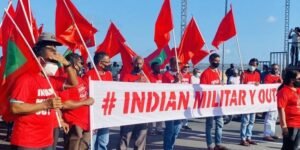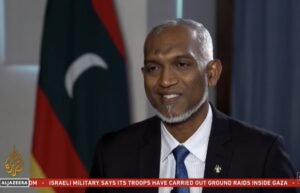
In a maneuver that has captured the global spotlight, President Mohamed Muizzu of the Maldives has conveyed his intention to reassess the presence of the Indian military within his nation. This unexpected pronouncement has ignited fervent debates both within the Maldives and on the international stage, sparking discussions about the ramifications for India-Maldives relations, regional stability, and the future of foreign military deployments. This article delves into President Muizzu’s rationale, the historical underpinnings of India’s military presence in the Maldives, potential consequences, and the broader implications of this decision.
Historical Context
Before we plunge into the current circumstances, it is imperative to grasp the historical backdrop of India’s military presence in the Maldives. India’s involvement in the region dates back several decades and is rooted in a bilateral agreement to establish a strategic dockyard. This facility operates as a logistical hub and symbolizes India’s dedication to the security and economic prosperity of the Maldives. Over the years, India has furnished extensive support to the Maldives across various domains, including defense, security, and overall development. This collaborative endeavor has cemented India’s position as a pivotal ally of the Maldives, particularly during times of political and security turmoil.
President Muizzu’s Pledge: The newly inaugurated President, renowned for his pro-China inclination, has consistently articulated his intention to withdraw foreign military personnel, including Indian troops, from the Maldives. This move represents a substantial departure from the nation’s previous foreign policy orientation.
The New President’s Perspective

Despite raising eyebrows, President Mohamed Muizzu has adopted a steadfast position during his election campaign. He has pledged to reassess and potentially curtail the presence of Indian military personnel in the Maldives. This decision emanates from his paramount concern: the necessity for greater sovereignty and autonomy in defense and security affairs. This standpoint resonates with a substantial segment of Maldivians who view foreign military presence as a prospective encroachment on their national sovereignty.
Implications

Several rationales have been posited to elucidate the Maldives’ aspiration to expel the Indian military. These concerns pivot around matters of sovereignty and the aspiration to wield greater authority over territorial integrity. Additionally, there is a burgeoning interest in nurturing relationships with other global stakeholders, particularly China.
The implications of President Muizzu’s stance are multifaceted. On one hand, it bears the potential to strain India-Maldives relations, historically characterized by collaboration and mutual support. A reduction or elimination of Indian military presence could engender ramifications for the security landscape in the Maldives and the broader Indian Ocean region. This transition can also be evaluated within the framework of regional power dynamics, with China’s influence in the region gradually ascending. Furthermore, this decision may impact India’s economic interests in the Maldives. India has substantially contributed to the Maldives’ economic development, and any adjustment in relations may affect ongoing projects and financial aid.
International Observations
The global community is vigilantly observing the developments in the Maldives. This situation underscores the intricate interplay between diminutive island nations, regional powers, and their larger neighbors on a global scale. It also raises questions regarding the consequences of foreign military deployments within sovereign nations and the role of bilateral agreements. China, as a pivotal actor in the Indian Ocean region, has been scrupulously monitoring these developments. The prospect of a diminished Indian military presence may furnish an opening for China to augment its influence in the Maldives and the broader region, thereby influencing the overall strategic equilibrium in the Indian Ocean.
The United States has adopted a cautious stance on this matter, abstaining from making public statements regarding President Muizzu’s commitment to withdraw Indian military personnel. This circumspect position reflects the intricacies of the situation.
Indian Response: The response of the Indian government to this development is of paramount significance. To address this matter, the Indian government has expressed its willingness to collaborate with the new Maldivian administration. The future trajectory of India-Maldives relations will hinge on diplomatic endeavors to address the concerns raised.
The Future of India-Maldives Relations
A pivotal question revolves around how this decision will impact India’s enduring relationship with the Maldives. These two nations have long nurtured robust cultural, economic, and political ties. Reassessing India’s military presence does not necessarily connote an adversarial rapport. Instead, it has the potential to lay the groundwork for a more equitable and self-reliant approach to national security.
Conclusion
The proclamation by the President of the Maldives to eliminate the Indian military presence has raised intricate questions concerning the future of India-Maldives relations, regional security, and the evolving geopolitics of the Indian Ocean. While this decision embodies the yearning for sovereignty and diversification of diplomatic relationships, it also poses challenges and uncertainties.
The situation demands judicious diplomacy and dialogue between the two nations to address concerns and find common ground. It underscores the significance of all stakeholders in the region vigilantly observing the situation and its implications for the broader geopolitical landscape. As the situation unfolds, it remains to be seen how India and the Maldives will navigate this critical juncture in their relationship and how it may reshape the dynamics of the Indian Ocean region.











Comments 1